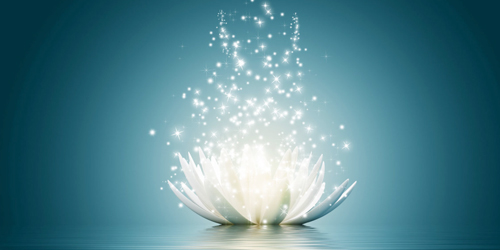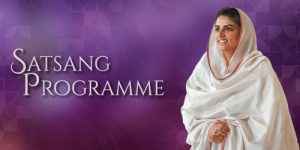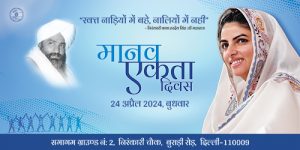With the help of the Gyan, revealed to me by her Holiness Satguru Mataji, I have come to realise Nirankar’s virtues such as love, compassion, humility, and forgiveness. I have also learned as to what it means to surrender to God’s Will.
Indeed, very few people will disagree with you when you speak of love and compassion. Even the most hardened souls will admit that the virtues of love and compassion are important and good to have. After all, we want to be loved; we have to experience and display compassion ourselves. Surrender, however, is altogether different. The word surrender invokes a passionate response. Many see it as a weakness, giving up, giving in, or losing out. The dictionary definition being, stop fighting and admit defeat.
However, if we are to truly accept Nirankar and embrace the Gyan experience, then surrender is essential. We cannot recognise and accept this God Knowledge (Gyan) without surrendering to it, and that means not in defeat, but in joy! When we surrender to God’s will, life becomes so much easier, and much less complicated. It brings an end to the constant struggle to control everything in our life.
We spend so much time trying to control every aspect of our lives. While it is important to be diligent about our actions and the impact they have on our future, it is easy to become wrapped up in the minutiae of life, distracted by the attempt to control things that we are not able to.
We can eat healthily and exercise to keep ourselves fit, but we cannot always control the environment around us that may impact on our health. We have the most amazing doctors and nurses. We have medical advances that mean we can live longer, but we still cannot control the inevitability of our death.
We can be criticized or ridiculed for surrendering to God. We may well have heard people say, well you might need to believe in something to help you get through life, but it’s not for me. What they are suggesting is that having faith is merely some sort of crutch, something to prop up our weakness with. It is, in fact, quite the opposite. To surrender to Nirankar – to lay down our ego – requires strength.
On a recent TED talk the question of why the universe is here was discussed for 17 minutes. The presenter shared various theories as to why the universe exists, with no mention of God. There was no satisfactory answer to the question at hand.
I then tuned into the latest BBC2 programme about the wonders of the universe, led by Professor Brian Cox. It was fascinating and awe-inspiring, hearing about the beginnings of time and space, and how the universe has expanded and grown. Indeed, as with all science programmes, it left viewers with more questions than answers.
The truth is, we simply do not know all the answers – at least, not with any certainty. Of course, it is important that we continue to explore the questions. We want scientists to use their brilliant minds to figure out the equations that prove the reason for the existence of the universe, and why we are here. It is man’s innate nature to question and to seek. I wonder, therefore, if one day they actually come up with the simple equation: God = Life.
The fact that we describe life through our sense organs – seeing, hearing, touch, taste and smell – it makes it terribly limiting. Scientists use physics and metaphysics to prove their theories, and yet the existence of God still eludes many of them. This is because philosophers and gurus through the centuries have always said that the essence of life cannot be described through the senses. It is beyond words, beyond imagination, and beyond sensory experience.
In Plato’s dialogues called The Apology, a friend of Socrates asks the Delphi Oracle if Socrates is the wisest person. The Oracle replies, yes, he is the wisest person. Socrates’ thought is contrary to this. He says: I know nothing.
He decides to ask others, lawyers and well educated people, are you wise, do you know things? They all answer in the affirmative, I am terribly wise because I know this and I know that.
Socrates comes to the conclusion that these people are all very ignorant and foolish. They do not know anything. They think they know something, which fools them into thinking that they have knowledge.
Thus he decides that he actually is the wisest person. He admits that he does not know anything, and accepts his own ignorance. He realises that knowledge and truth continually escape him, and that it requires effort and dedication to pursue these things. Hence Socrates is wise because of his ignorance.
In realising that we do not know, we know something. We know there is something more to understand, which becomes a catalyst for further enquiry. When we appreciate what we do not know about life, spirituality and the universe, it can be a stepping stone towards learning more about God. By laying down our ego, our sense of ‘I’, we can begin to explore the whole.
We all have a choice about how we live the life that we have been given. It is not for us to judge others on what they choose to do with it. Judging others serves no one.
You may have come across Ruth Coker Burns on social media in recent times. She was visiting a friend in hospital when she saw a man lying in a room on his own. He was dying, calling out for his mother. This was in the 1980’s when AIDS was first becoming known; the patient was an AIDS sufferer. He had been rejected by his family and friends. Even the nurses, fearful of this little known disease, were drawing straws to see who should tend to him.
Ruth sneaked into his room and spent the last 13 hours of his life by his bedside. She called his mother and begged her to come, but she refused. When the patient died, she arranged his cremation and for his ashes to be laid in her own family plot.
Ruth went on to help over 1000 other AIDS patients. She took them to appointments, and stayed at their bedside when they were dying. She laid the ashes of another 40 people to rest in her now extended family plot. She said, they were all buried with love. This is Love in its purest form. This is true humanity, compassion in action and total lack of prejudice.
As I say, we all have a choice in how we spend our lives. For me, I choose love and surrender to God’s will, knowing that the control we think we have is an illusion. Knowing, like Socrates, that we know something when we realise we know nothing, ushers a spirit of surrender within which we may seek the truth, which is the Gyan.
The Gyan makes us one with Formless Nirankar – the origin, cause and sustaining force of the universe. In such a state we rise above duality. There is the limitless expanse of Nirankar alone, and no ‘I’ ‘me’ or ‘mine’.
Margaret Fletcher, Staffordshire, UK








